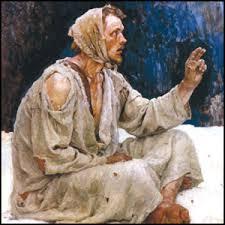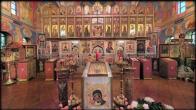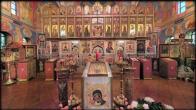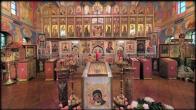You are here
Blessed are the poor in spirit, for theirs is the Kingdom of Heaven

Usually the poor have nothing of their own and must ask others for help. The poor are not ashamed to admit that they get all their substance as gifts. The poor in spirit, like the ordinary poor, know they have nothing of their own in their souls, and that God gives them all their spiritual wealth and talents. Concerning the poor in spirit, the holy, righteous John of Kronstadt has written wisely:
The man poor in spirit sincerely acknowledges himself to be a spiritual pauper, having nothing of his own; whoever waits for everything from God's loving-kindness; whoever is convinced that he can neither think, nor desire anything good, if God will not give the good thought and the good desire, and that he cannot perform one truly good deed without the grace of Jesus Christ; whoever considers himself to be more sinful, worse, lower than everyone; whoever always reproaches himself and judges no one else; whoever acknowledges the garment of his soul to be defiled, dark, malodorous, worthless and does not cease to ask the Lord Jesus Christ to lighten the garment of his soul, to clothe him in the incorrupt clothing of righteousness; whoever unceasingly flees beneath the shelter of God's wings, not having safety anywhere in the world besides the Lord; whoever considers all his property to be God's gift and gives thanks for everything to the Bestower of every good thing and readily apportions his property to the those in need—this is he who is poor in spirit.
The First Commandment of Blessedness is also the first condition for spiritual life. Whoever is poor in spirit is blessed, says the Lord. This blessed poverty is called spiritual in the Gospel according to Matthew, because it is first of all a state of the mind and heart, pertaining to the disposition of the soul. It likewise stands for the complete openness of a man before God, for freedom from all pride and from faith in the power of his own spirit, his own ideas and opinions—for freedom from the vain imaginings of his own heart (Jeremiah 23:17, Romans 1:21), as spoke the Prophet Jeremiah in the Old Testament and the Apostle Paul in the New Testament. The words of John of Kronstadt again explain why the man poor in spirit is blessed:
Where there is humility, consciousness of one's neediness, one's poverty, wretchedness, there God is, there the cleansing of sins is, there peace, light, freedom, contentment and blessedness are. To such poor in spirit the Lord came to preach the gospel of the kingdom of God, as is said: he hath sent me to preach the gospel to the poor (Luke 4:18), to the poor in spirit, but not to the rich; for their pride alienates them from the grace of God... If people readily extend the hand of help and compassion to those who are truly poor and in extreme need of the very necessities of life, is not God even more compassionate regarding spiritual poverty, does he not paternally condescend to it at its call and fill it with His spiritual treasures? It is said: He hath filled the hungry with good things (Luke 1:53).
Are not the valleys abundantly bedewed with moisture; do not the valleys blossom, are they not fragrant? Is it not on the mountains where snow and ice are, where lifelessness is? High mountains are an image of the proud; valleys are an image of the humble: Every valley shall be filled, and every mountain and hill shall be brought low (Luke 3:5) (we read from the Prophet Isaiah). God resisteth the proud, but giveth grace unto the humble (James 4:6), instructs the Apostle James. Love humility, teaches Saint Anthony the Great, and it will cover all thy sins. Do not envy him who is going upwards, but it is better that thou consider all people higher than thyself, so that God Himself would be with thee (from the Philocalia).
The holy, righteous John of Kronstadt and Saint Anthony the Great take up the theme of humility, which is inseparably tied to the first commandment of blessedness. These divinely inspired men, as also all the saints, teach with one voice that only those who are free from egotistical love for themselves are fit to receive the grace of God to become blessed. The Mother of God, being herself a perfect poverty of spirit, proclaims in her magnificent hymn, that God—"Hath shown strength with his arm; he hath scattered the proud in the imagination of their hearts. He hath put down the mighty from their seats, and exalted them of low degree. He hath filled the hungry with good things; and the rich he hath sent empty away (Luke 1:51-54)."
Jesus Christ Himself not only had no place where to lay his head (Matthew 8:20), but His physical poverty was a direct result of His complete poverty of spirit. He said:
Verily, verily, I say unto you, The Son can do nothing of himself, but what he seeth the Father do. . . . I can of my own self do nothing (John 5:19, 30).
A Christian is called to leave everything and follow Christ in poverty of spirit, becoming free of the sinful desires of this world. According to the world of the Apostle John the Theologian:
If any man love the world, the love of the Father is not in him. For all that is in the world, the lust of the flesh, and the lust of the eyes, and the pride of life, is not of the Father, but is of the world. And the world passeth away, and the lust thereof: but he that doth the will of God abideth for ever (I John 2:15-17).
The holy Fathers of the Church wrote very much about humility, considering that a correct spiritual life needs this virtue more than all else. Saint Isaac the Syrian, for example, writes:
"The truly righteous always think within themselves that they are unworthy of God; it is known that they are truly righteous by the fact that they consider themselves wretched and unworthy of God's care, and they confess this secretly and openly and they grow wiser by this through the Holy Spirit—in order to remain in labor and straitness while they are still found in this life. Christian Life According to the Philocalia."
Who can understand this? How can a man standing close to God consider himself to be sinful, unworthy of God's care, the least of men? The answer we find in the life of the holy Abba Dorotheus:
"I remember once we had a conversation about humility, and one of the notable citizens of the city was amazed on hearing our words that the nearer one draws to God, the more he sees himself to be a sinner, and he said: How can this be? And not understanding, he wished to find out what these words mean? I said to him: O notable Citizen, tell me, how dost thou regard thyself in thine own city? He answered: I regard myself as great and as first in the city. I say to him: If thou shouldst go to Caesarea, how wouldst thou regard thyself there? He answered: As the least of the grandees there. And if, I say to him again, thou shouldst travel to Antioch, how wouldst thou regard thyself there? There, he answered, I would consider myself as one of the common people. And if, I say, thou shouldst go to Constantinople and approach the Emperor, how wouldst thou begin to regard thyself there? And he answered: Almost as nothing. Then I answered him: So it is also with the saints: the nearer they draw to God, the more they see themselves to be sinners."
An ancient patericon (a collection of short stories about strugglers for piety) says: The clearer the water, the more noticeable are the smallest specks in it. When a ray of the sunlight falls on a room, it enables the eye to see myriad dust particles borne in the air, which until the penetration of the ray were not noticeable. So also with the human soul: The more purity in her, the more heavenly, divine light falls on her, and the more does the soul notice imperfections and sinful habits in herself.
The higher a man is in his morally, the more humble he is, and the more clear and constant is his consciousness of his sin.
The contemporary church writer, Tito Colliander, in Way of the Ascetics, chapter 8, gives the same counsel on poverty of spirit:
"Take remarks without grumbling: be thankful when you are scorned, disregarded, ignored. But do not create humbling situations; they are provided in the course of the day as richly as you need. We notice the person who is for every bowing and fussily servile, and perhaps say, How humble he is! But the truly humble person escapes notice: the world does not know him (I John 3:1); for the world he is a mostly zero. When Peter and Andrew, John and James left their nets and followed him (Matthew 4:20) what did their fellow workers say, who were left on the shore? For them the two pairs of brothers vanished; they were gone. Do not be hesitant; do not be afraid of disappearing like them, from this adulterous and sinful generation; what are you hoping to win, the world or your soul (Mark 8:34-38)? Woe to you, when all men shall speak well of you (Luke 6:26)."
God first revealed his will that all His creatures would be poor in spirit, and they breached this spiritual state by what is called the ancestral sin, the source of all our misfortunes and sorrows. To be delivered from the consequences of ancestral sin, one must become poor in spirit, like the hungry poor, who ask God for spiritual food, and whom the Lord feeds with fruits of the Spirit. The Apostle Paul counts these fruits: love, joy, peace, longsuffering, gentleness, goodness, faith (Galatians 5:22). The man poor in spirit can is quoting these other words of the Apostle Paul: poor, yet making many rich (II Corinthians 6:10).
The venerable Starets Siluan of Mount Athos was poor in spirit, and he lived in our time, and enriched us with his wisdom and prayers:
The Lord said: Learn of me; for I am meek and lowly in heart. Wherefore my soul wearies day and night; and I beseech God and all the Saints in heaven, and all of you who have come to known the humility of Christ—pray for me, pray that the lowly spirit of Christ for which my soul weeps in longing may descend on me. I could not do otherwise than long for this humility which my soul once knew through the Holy Spirit, until I lost this gift, and so my soul yearns after it in tears.
O greatly-merciful Master, grant us a humble spirit, that our souls would find repose in Thee.
O most holy Mother of the Lord, obtain for us, O Merciful One, a humble spirit.
O all ye Saints, ye live in the heavens and ye see the glory of the Lord, and your spirit rejoices, pray that we also would be with you. My soul also yearns to see the Lord, and it longs for him in humility, as unworthy of this good.
O humility of Christ! I know thee, but I cannot attain thee. Thy fruits are sweet, because they are not earthly.
O merciful Lord, by the Holy Spirit teach us Thy humility.
To that said by the venerable Siluan, it is possible to add only the word Amen.
Archpriest Victor Potapov
PARISH LIFE
RECENT VIDEOS
Address of our Cathedral
Subscribe to our mailing list
While all the materials on this site are copyrighted, you may use them freely as long as you treat them
with respect and provide attribution on the Russian Orthodox Cathedral of St.John the Baptist of Washington DC.









